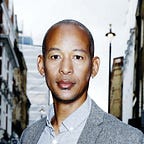In Defence of Jonathan Franzen
What I’d like to know first is who came up with the title and who wrote the standfirst. Maybe it was Jonathan himself. But from experience, those jobs normally go to a sub-editor. Did she or he know what they were doing?
Then, again, Jonathan Franzen has form in this area. The climate change area. And a few others that have earned him both criticism and detractors over the years.
I confess that I have never read a Franzen novel. I have, however, been exposed to the Franzenian contrarian through his contributions to The New Yorker. It was one of these recent articles that triggered off a big, online backlash. One that I imagine even Jonathan himself wasn’t expecting.
Global warming is a subject many people, from writers to politicians, avoid. Not our Jonathan, though. He has weighed in on it occasionally and his opinions, while contentious (at least some of them), are worth listening to and analysing.
Franzen’s argument focused on the big vs small. As in big subjects, like environmental destruction versus small issues like breakdown of local communities and money-driven gentrification. There’s nothing wrong about lobbying for and supporting worldwide causes like climate change and he’s clear about that. There is, however, something unwholesome about not investing the same energy on local projects.
Here Jonathan raises a point that I, too, raised with a couple of Extinction Rebellion volunteers when I went down to Trafalgar Square recently. How do you deal with the human concept of present and future? One of the challenges we, climate-conscious citizens, face is that the impending destruction of our planet will not happen overnight but in a few decades hence. Surely, there will be more wildfires, floods, landslides and human-made catastrophes along the way, but we will do what humans have been done since the beginning of time: adapt. Therefore, the picture painted by XR and similar groups remains abstract to many. By contrast, the closure of a local community centre is more immediate, visual and personal.
The key theme is Jonathan Franzen’s article is the finite nature of our existence and what to do while we’re still here, on planet Earth. To me this brings in a few elements: awareness of who we are as humans, the impact we have on our…
